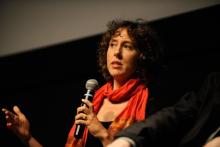Main Content
The White Paper on the Future of the PhD in the Humanities (WP) looks at the increasing number of PhDs and the decreasing number of academic jobs, and argues that there is much to be gained in a society by having people pursue graduate work in the Humanities–i.e., the ability to think critically, to read across discourses, to nurture the senses, and to imagine alternative futures – but that we need to better equip students with skills that are not just honed for academic careers. WP challenges the ways in which graduate work is conceptualized, and calls for greater collaboration and publicity. Though it still values the importance of individual contributions to knowledge, WP emphasizes the collaborative character of all kinds of learning. And it proposes the “reorientation of graduate research and the forms of its production and publication to address multiple audiences inside and outside the academy and to enable students to participate actively in the life of the public.” I am enthusiastic about the idea that we academics can begin to rethink our task, seeing ourselves less as scholars who talk to each other and train students in our own self-image, and more as public intellectuals who shape critical thinkers able to fully engage with an ever-more complex society.
The White Paper posits two possible reconfigurations of the PhD and I have allowed myself to imagine a restructuring of a Comparative Literature program based on its “Workshop PhD”, which it conceives as “an interdisciplinary research group led by a small group of faculty who have agreed to take a leadership role for five years.”
I propose a program whose mission statement is to teach critical thinking skills through a comparatist analysis of politics, literature, language, philosophy, cinema, and new media. This would be accomplished through a core faculty of 3-4 professors who teach a year-long core course. On top of that, there would be a rotating 5-year project conceptualized under a broad theme, such as Art in the Public Sphere. Faculty from across the university would be invited to respond to a call for applications for this topic, and 4-5 of them would be chosen and seconded from their home department for 25% of their appointment for five years. They would be required to teach a one-semester course yearly and participate in an ongoing workshop. In the third year, overlap would begin with the next topic, e.g., Urban Humanities. 1-2 faculty members would be brought in to begin to work with students who had applied to this theme, and the preceding faculty and students would dovetail into this linked theme.
The workshop model would aim to carry out graduate training through both individual and collaborative projects, and allow students to gain their PhD through a tailored program that could be a standard dissertation but could also be (for example) a series of 4 different policy papers, documentaries, interviews, or collaborative articles. Comparative Literature would be offering a space for students to think and work together and to engage in an intellectual project that does not necessarily assume that students will be seeking academic jobs. This model would bring groups of people together under a shared research project to work collaboratively and openly so as to further that investigation and share it with different publics. If we make sure that students finish in a timely manner (4-5 years) and fully fund them while they are studying, then they are being given an opportunity to think, engage, imagine, and experiment with ideas and skills that they can use in different career trajectories.
